Sir John Monash, Personal Files Book 1, 15 December 1914 - 5 January 1915 - Part 8
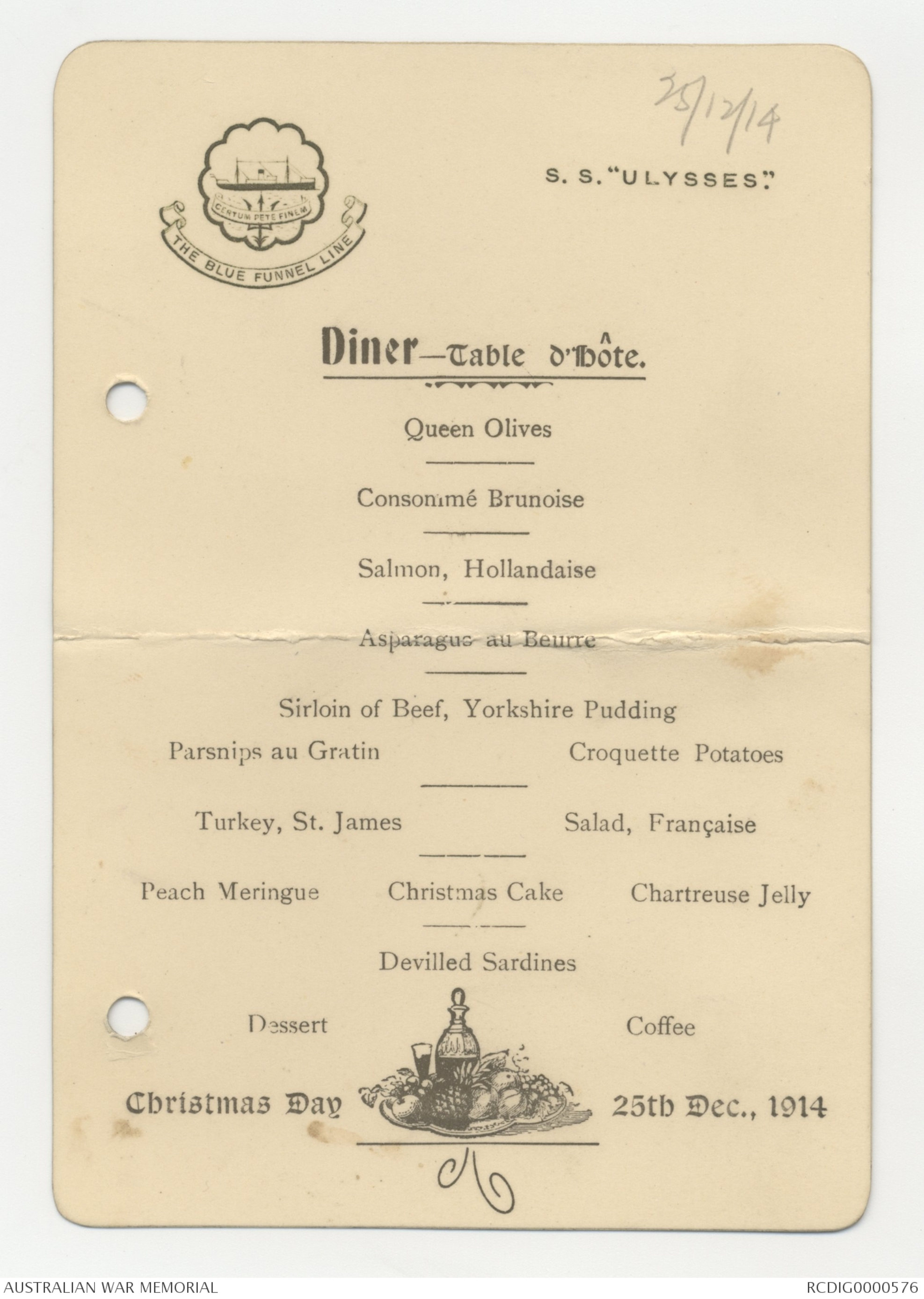
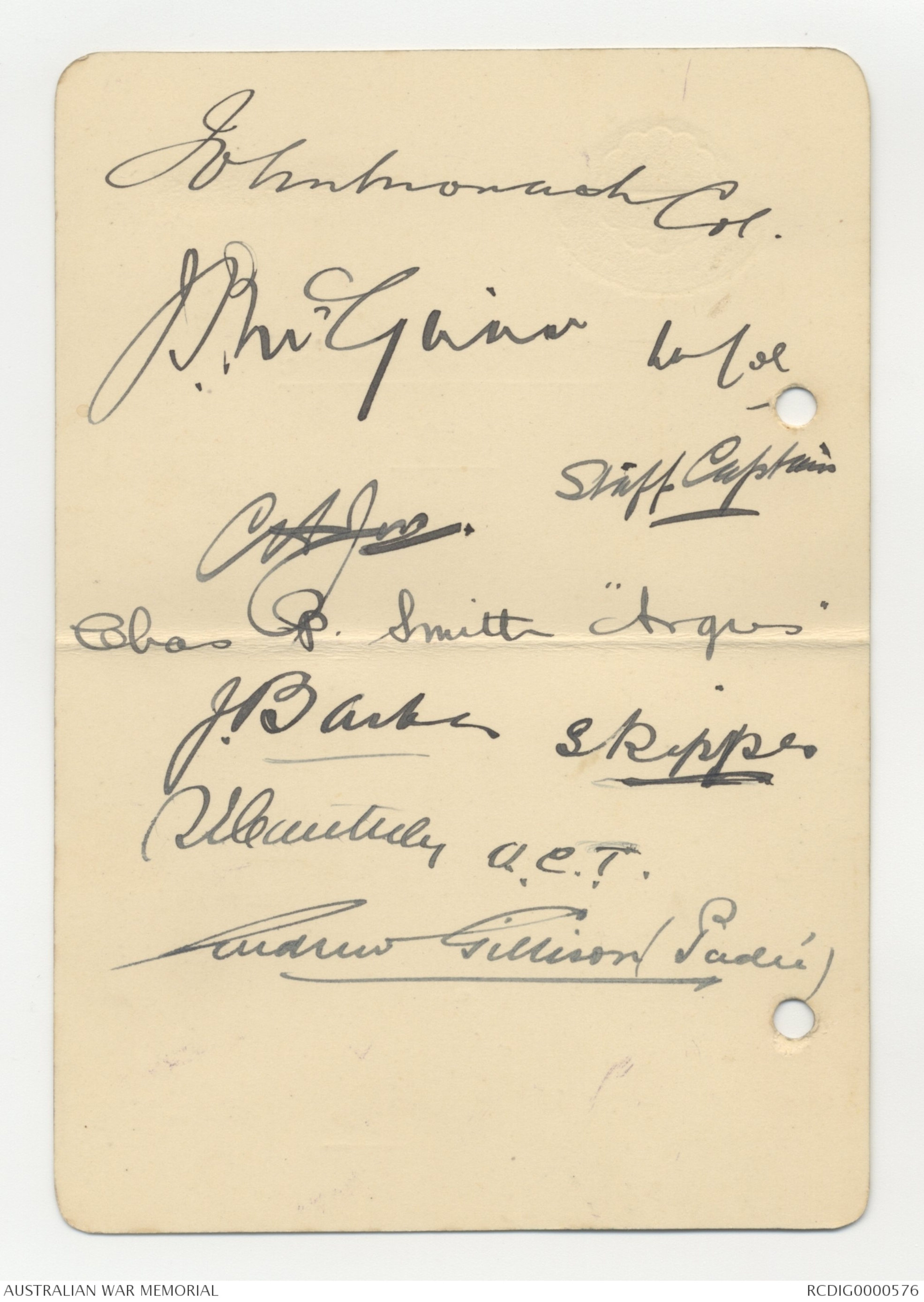
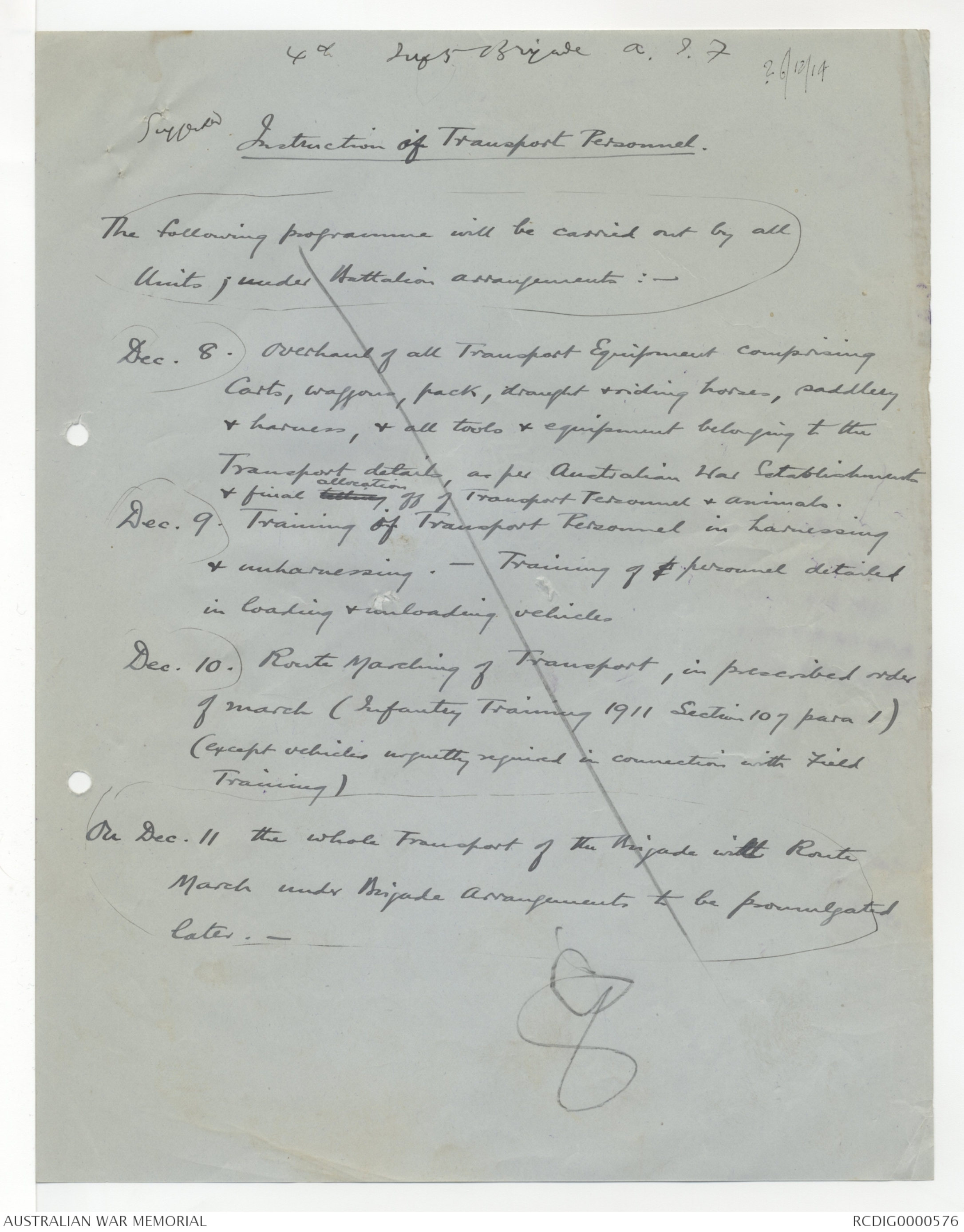
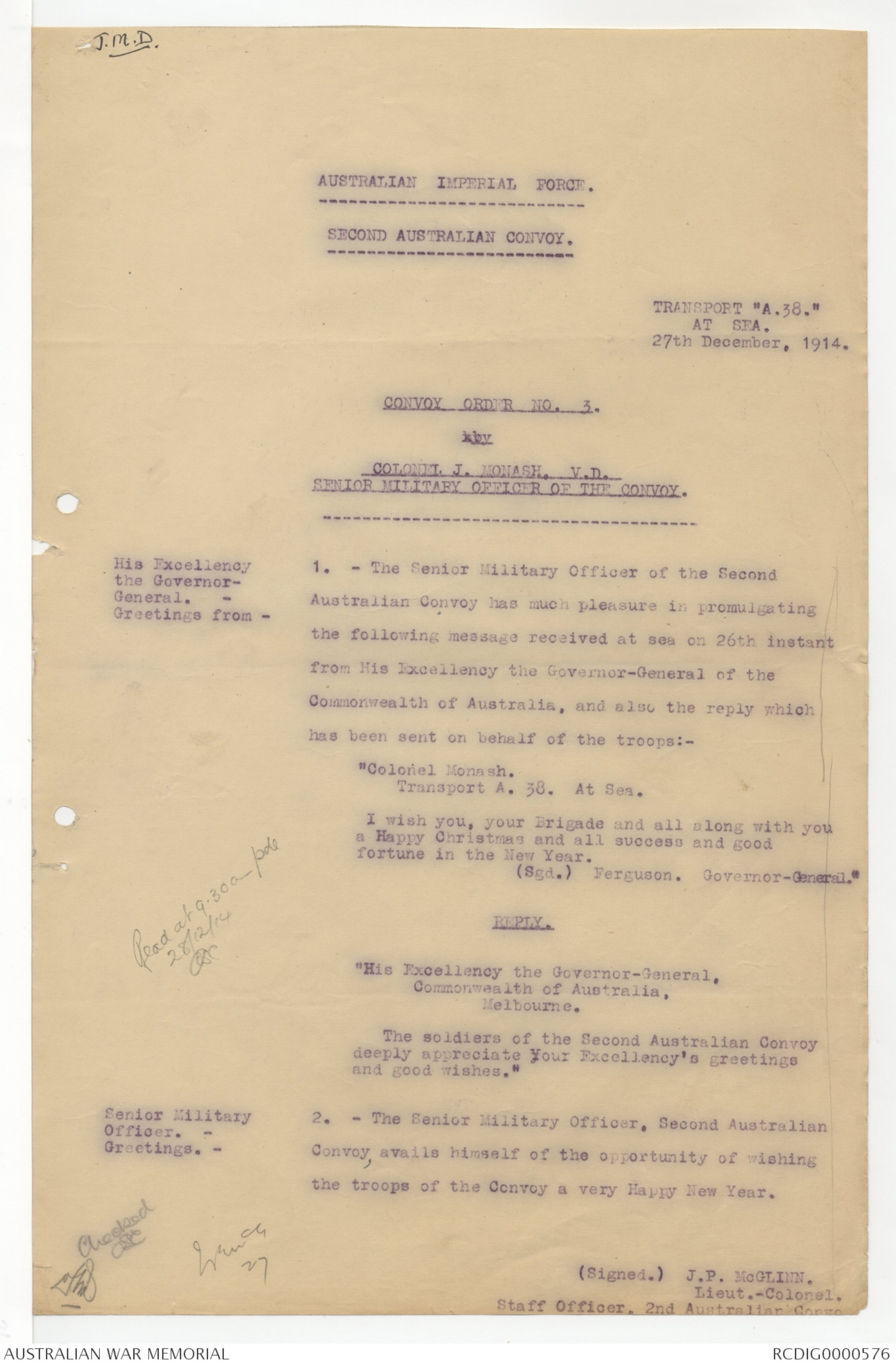
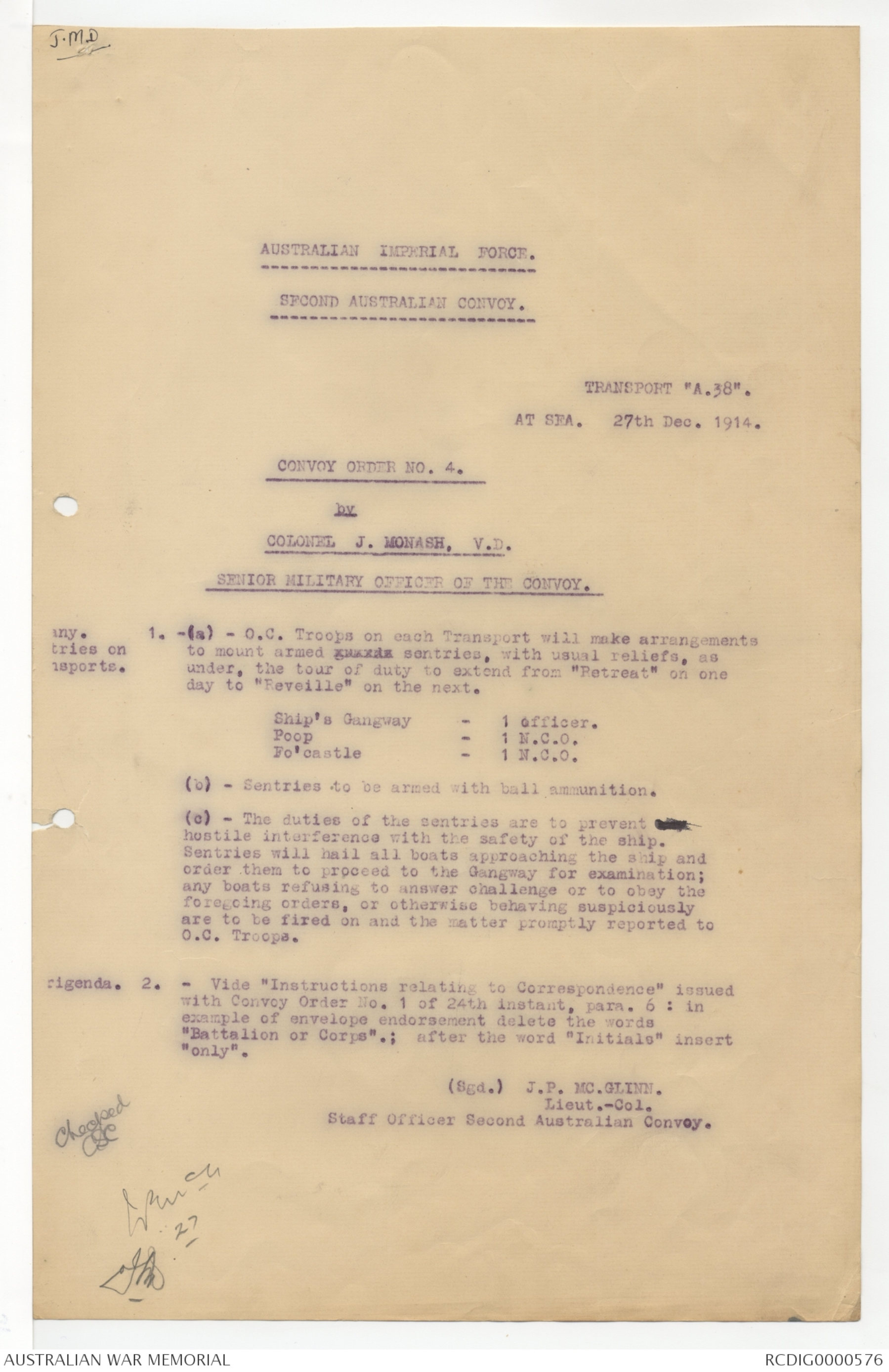
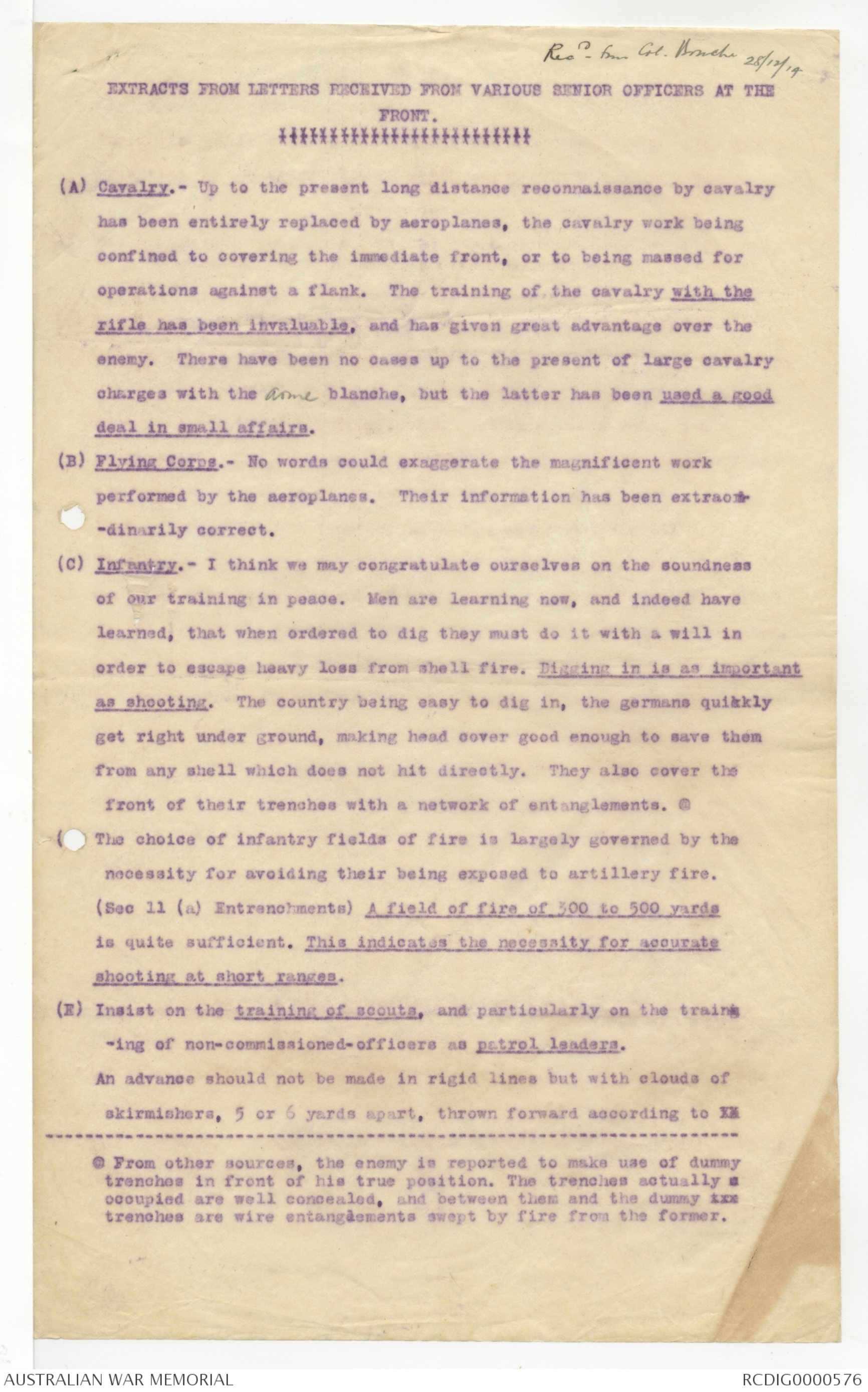
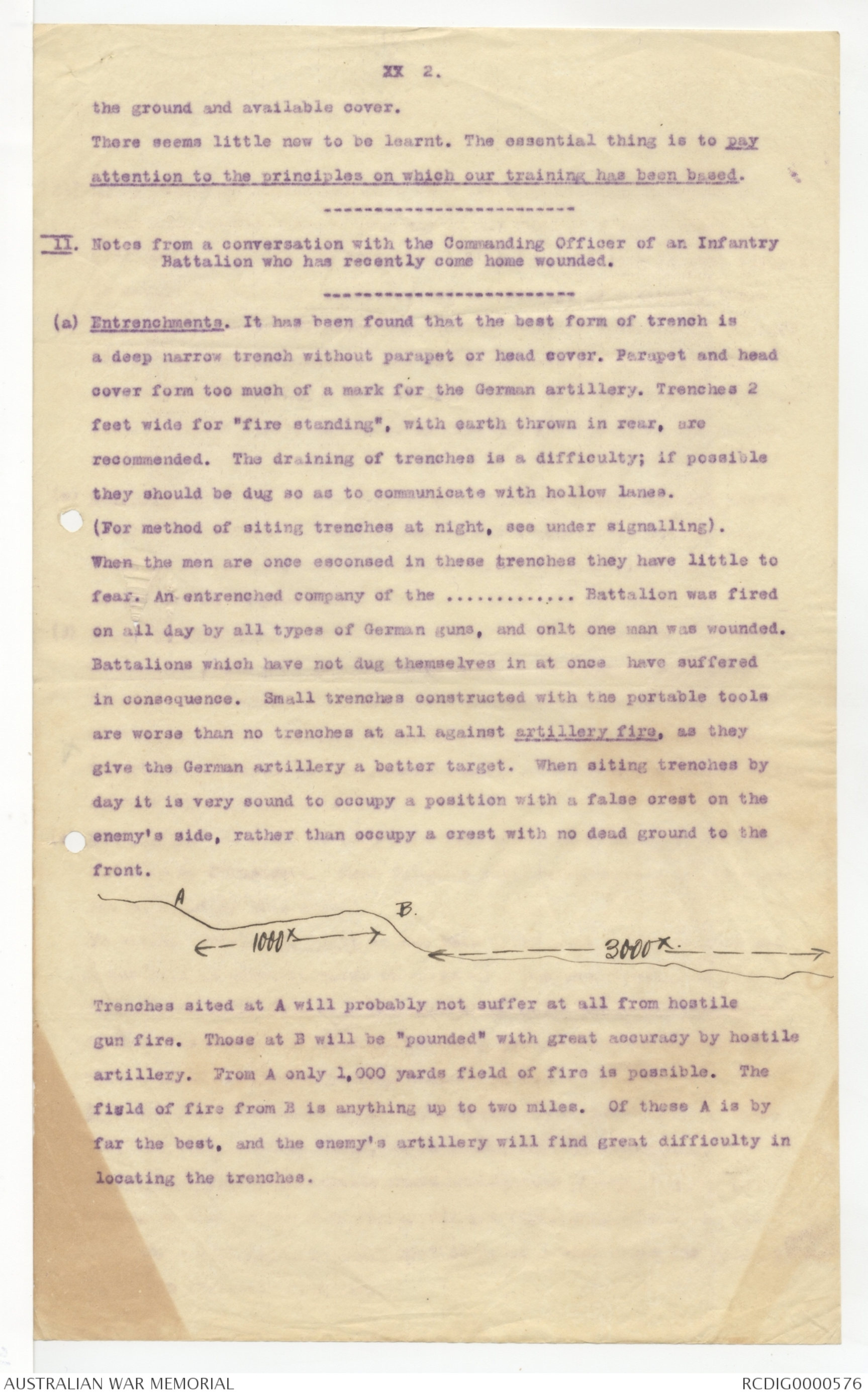
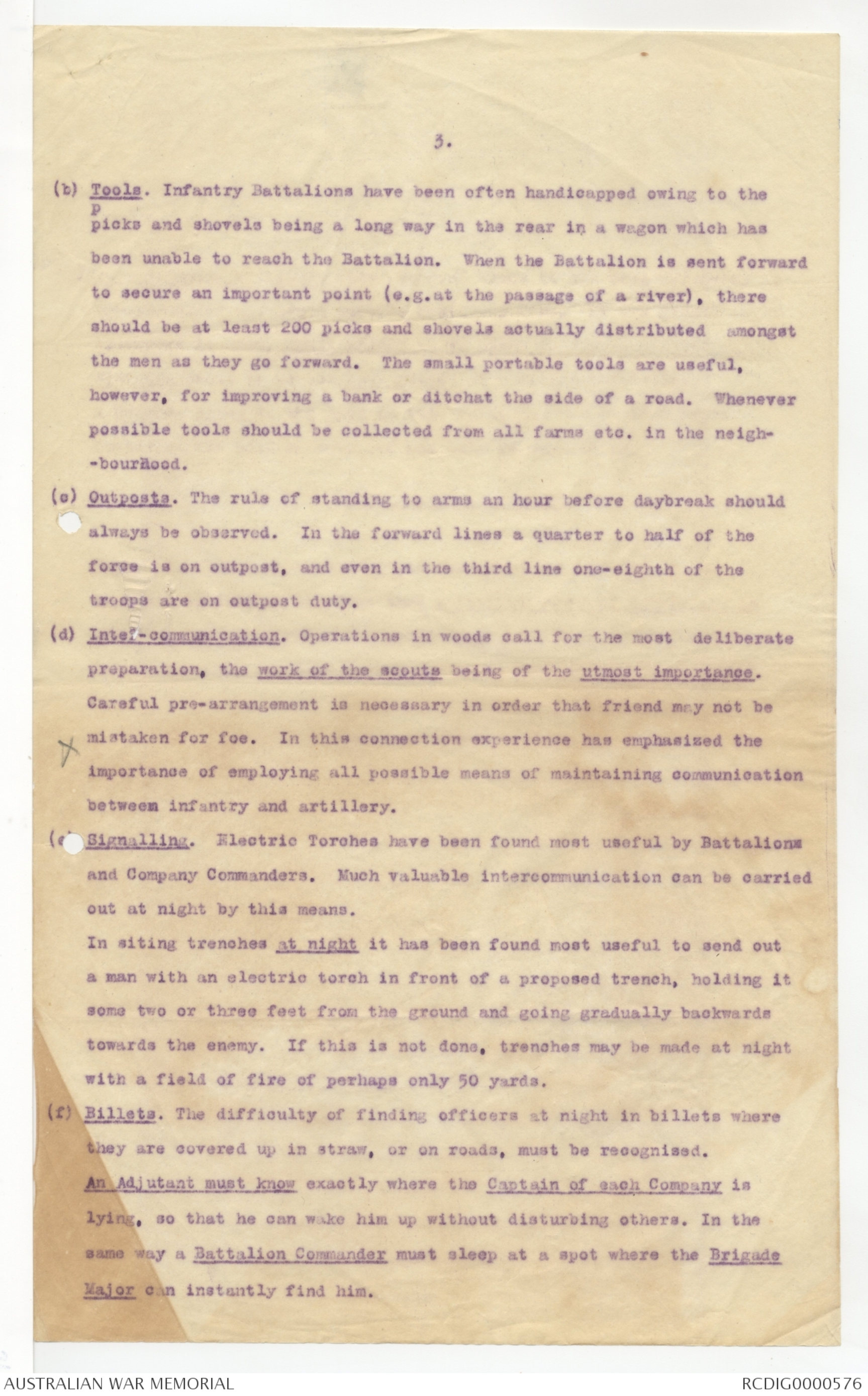
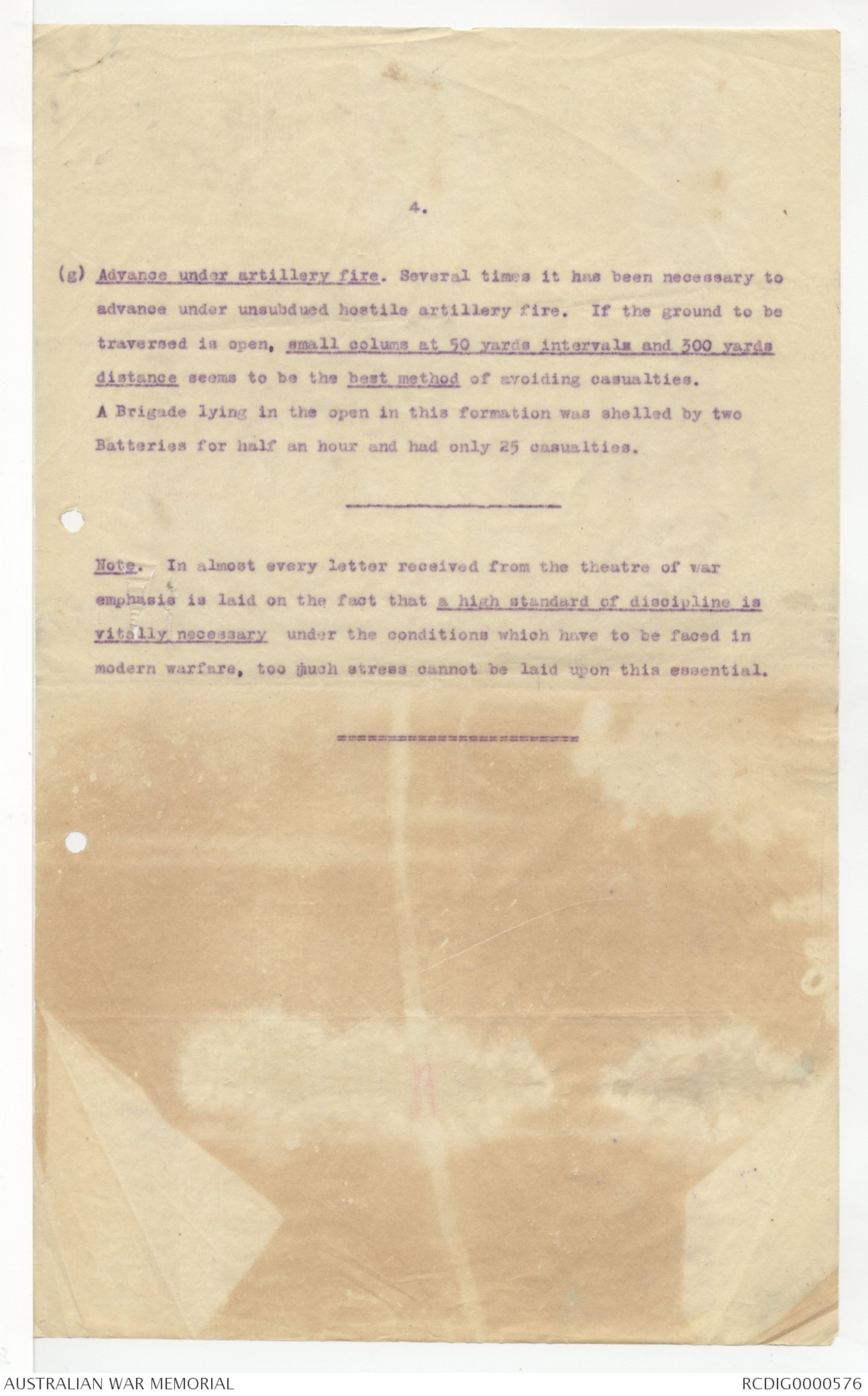
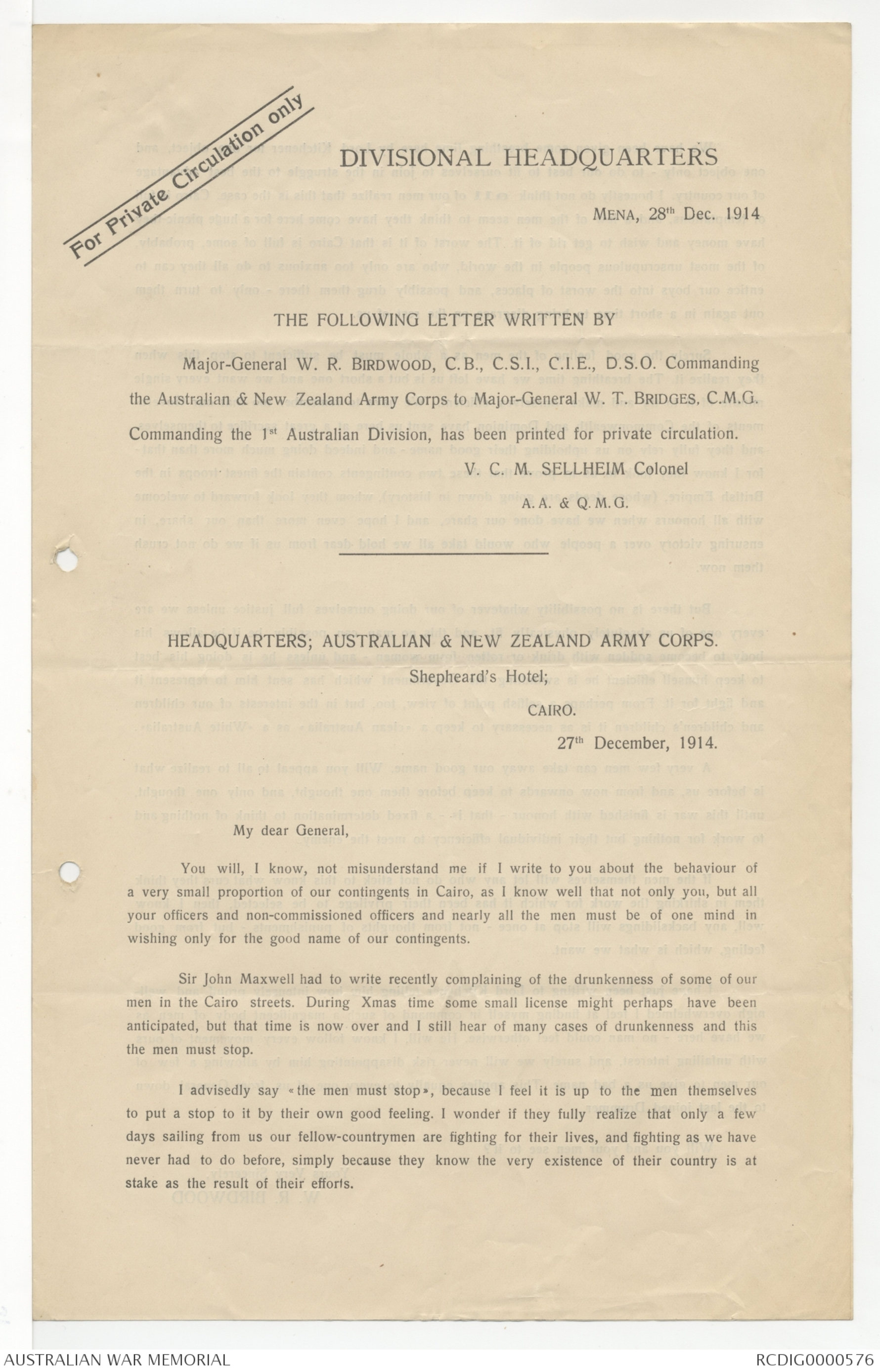
25/12/14
S.S."Ulysses".
Certum Pete Finem
The Blue Funnel Line
Diner - Table d' hote.
Queen Olives
Consomme Brunoise
Salmon, Hollandaise
Aparagus au Beurre
Sirloin of Beef, Yorkshire Pudding
Parsnips au Gratin Croquette Potatoes
Turkey, St. James Salad, Francaise
Peach Meringue Christmas Cake Chartreuse Jelly
Devilled Sardines
Dessert Coffee
CHRISTMAS DAY 25th Dec., 1914
John Monash Col.
JP McGlinn Lt Col
C A Jones Staff Captain
Chas P. Smith "Argus"
J.Barker Skipper
[?le?ctuly?]A.C.T.
Andrew Gillison (Padré)
4th Inf [[5?]] Brigade A.I.F.
26/12/14
Suggested
Instruction of Transport Personnel
The following programme will be carried out by all
Units ; under Battalion arrangements : —
Dec. 8. Overhaul of all Transport Equipment comprising
Carts, waggons, pack, draught & riding horses, saddlery
& harness, & all tools & equipment belonging to the
Transport details, as per Australian War Establishments
& final letting allocation off of Transport Personnel & animals.
Dec. 9. Training of Transport Personnel in harnessing
& unharnessing. — Training of s personnel detailed
in loading & unloading vehicles
Dec. 10. Route Marching of Transport, in prescribed order
of march (Infantry Training 1911 Section 107 para 1)
(except vehicles urgently required in connection with Field
Training)
On Dec.11 the whole Transport of the Brigade will Route
March under Brigade arrangements to be promulgated
later. —
8
J.M.D.
AUSTRALIAN IMPERIAL FORCE.
SECOND AUSTRALIAN CONVOY.
TRANSPORT "A.38."
AT SEA.
27th December, 1914.
CONVOY ORDER NO. 3.
by
COLONEL. J. MONASH. V.D.
SENIOR MILITARY OFFICER OF THE CONVOY.
---------------------------------------------------------------
His Excellency
the Governor-
General.
- Greetings from-
1. - The Senior Military Officer of the Second
Australian Australian Convoy has much pleasure in promulgating
the following message received at sea on 26th instant
from His Excellency the Governor-General of the
Commonwealth of Australia, and also the reply which
has been sent on behalf of the troops:-
"Colonel Monash.
Transport A. 38. At Sea.
I wish you, your Brigade and all along with you
a Happy Christmas and all success and good
fortune in the New Year.
(Sgd.) Ferguson. Governor-General."
REPLY
"His Excellency the Governor-General,
Commonwealth of Australia,
Melbourne.
The soldiers of the Second Australian Convoy
deeply appreciate Your Excellency's greetings
and good wishes."
{*Recd at 9.30 am [[pde?]] 28/12/14*}
Senior Military Officer. - Greetings. -
2. - The Senior Military Officer, Second Australian
Convoy, avails himself of the opportunity of wishing
the troops of the Convoy a very Happy New Year.
(Signed.) J.P. MCGLINN.
Lieut.-Colonel.
Staff Officer. 2nd Australian Convoy
(*Checked[[?]]*)
(*JPMcG*)
(*27*)
J.M.D.
AUSTRALIAN IMPERIAL FORCE.
SECOND AUSTRALIAN CONVOY.
TRANSPORT "A.38".
AT SEA. 27th Dec. 1914.
CONVOY ORDER NO. 4.
by
COLONEL J. MONASH. V.D.
SENIOR MILITARY OFFICER OF THE CONVOY.
[[any?]]
[[tries?]]
on [[nsports?]]
1.-(a) - O.C. Troops on each Transport will make arrangements
to mount armed guards sentries, with usual reliefs, as
under, the tour of duty to extend from "Retreat" on one
day to "Reveille" on the next.
Ship's Gangway - 1 officer.
Poop - 1 N.C.O.
Fo'castle - 1 N.C.O.
(b) - Sentries to be armed with ball ammunition.
(c) - The duties of the sentries are to prevent any
hostile interference with the safety of the ship.
Sentries will hail all boats approaching the ship and
order them to proceed to the Gangway for examination;
any boats refusing to answer challenge or to obey the
foregoing orders, or otherwise behaving suspiciously
are to be fired on and the matter promptly reported to
O.C. Troops.
[[rigenda?]]. 2. - Vide "Instructions relating to Correspondence" issued
with Convoy Order No. 1 of 24th instant, para.6: in
example of envelope endorsement delete the words
"Battalion or Corps".; after the word "Initials" insert
"only".
(Sgd.) J.P. MC.GLINN.
Lieut.-Col.
Staff Officer Second Australian Convoy.
Checked CSC
Lynch
27
JM
Recd. from Col. Bruche 28/12/14
EXTRACTS FROM LETTERS RECEIVED FROM VARIOUS SENIOR OFFICERS AT THE
FRONT
___________________________________________________
(A) Cavalry. - Up to the present long distance reconnaissance by cavalry
has been entirely replaced by aeroplanes, the cavalry work being
confined to covering the immediate front, or to being massed for
operations against a flank. The training of the cavalry with the
rifle has been invaluable, and has given great advantage over the
enemy. There have been no cases up to the present of large cavalry
charges with the arme blanche, but the latter has been used a good
deal in small affairs.
(B) Flying Corps. - No words could exaggerate the magnificent work
performed by the aeroplanes. Their information has been extraordinarily
correct.
(C) Infantry. - I think we may congratulate ourselves on the soundness
of our training in peace. Men are learning now, and indeed have
learned, that when ordered to dig they must do it with a will in
order to escape heavy loss from shell fire. Digging in is as important
as shooting. The country being easy to dig in, the germans quickly
get right under ground, making head cover good enough to save them
from any shell which does not hit directly. They also cover the
front of their trenches with a network of entanglements.
( The choice of infantry fields of fire is largely governed by the
necessity for avoiding their being exposed to artillery fire.
(Sec 11 (a) Entrenchments) A field of fire of 300 to 500 yards
is quite sufficient. This indicates the necessity for accurate
shooting at short ranges.
(E) Insist on the training of scouts, and particularly on the training
of non-commissioned-officers as patrol leaders.
An advance should not be made in rigid lines but with clouds of
skirmishers, 5 or 6 yards apart, thrown forward according to XX
----------------------------------------------------------------------------
From other sources, the enemy is reported to make use of dummy
trenches in front of his true position. The trenches actually o
occupied are well concealed, and between them and the dummy xxx
trenches are wire entanglements swept by fire from the former.
XX 2.
the ground and available cover.
There seems little now to be learnt. The essential thing is to pay
attention to the principles on which our training has been based.
------------------------------------------
11.Notes from a conversation with the Commanding Officer of an Infantry
Battalion who has recently come home wounded.
---------------------------------------------------
(a) Entrenchments. It has been found that the best form of trench is
a deep narrow trench without parapet or head cover. Parapet and head
cover form too much of a mark for the German artillery. Trenches 2
feet wide for "fire standing", with earth thrown in rear, are
recommended. The draining of trenches is a difficulty; if possible
they should be dug so as to communicate with hollow lanes.
(For method of siting trenches at night, see under signalling).
When the men are once esconsed in these trenches they have little to
fear. An entrenched company of the .................Battalion was fired
on all day by all types of German guns, and onlt one man was wounded.
Battalions which have not dug themselves in at once have suffered
in consequence. Small trenches constructed with the portable tools
are worse than no trenches at all against artillery fire, as they
give the German artillery a better target. When siting trenches by
day it is very sound to occupy a position with a false crest on the
enemy's side, rather than occupy a crest with no dead ground to the
front.
Trenches sited at A will probably not suffer at all from hostile
gun fire. Those at B will be "pounded" with great accuracy by hostile
artillery. From A only 1,000 yards field of fire is possible. The
field of fire from B is anything up to two miles. Of these A is by
far the best, and the enemy's artillery will find great difficulty in
locating the trenches.
3.
(b) Tools. Infantry Battalions have been often handicapped owing to the
p
picks and shovels being a long way in the rear in a wagon which has
been unable to reach the Battalion. When the Battalion is sent forward
to secure an important point (e.g. at the passage of a river), there
should be at least 200 picks and shovels actually distributed amongst
the men as they go forward. The small portable tools are useful,
however, for improving a bank or ditchat the side of a road. Whenever
possible tools should be collected from all farms etc. in the neighbourhood.
(c) Outposts. The rule of standing to arms an hour before daybreak should
always be observed. In the forward lines a quarter to half of the
force is on outpost, and even in the third line one-eighth of the
troops are on outpost duty.
(d) Intel-communication. Operations in woods call for the most deliberate
preparation, the work of the scouts being of the utmost importance.
Careful pre-arrangement is necessary in order that friend may not be
(* X) mistaken for foe. In this connection experience has emphasized the
importance of employing all possible means of maintaining communication
between infantry and artillery.
(e) Signalling. Electric Torches have been found most useful by Battalion
and Company Commanders. Much valuable intercommunication can be carried
out at night by this means.
In siting trenches at night it has been found most useful to send out
a man with an electric torch in front of a proposed trench, holding it
some two or three feet from the ground and going gradually backwards
towards the enemy. If this is not done, trenches may be made at night
with a field of fire of perhaps only 50 yards.
(f) Billets. The difficulty of finding officers at night in billets where
they are covered up in straw, or on roads, must be recognized.
An Adjutant must know exactly where the Captain of each Company is
lying, so that he can wake him up without disturbing others. In the
same way a Battalion Commander must sleep at a spot where the Brigade
Major can instantly find him.
4.
(g) Advance under artillery fire. Several times it has been necessary to
advance under unsubdued hostile artillery fire. If the ground to be
traversed is open, small colums at 50 yards intervals and 300 yards
distance seem to be the best method of avoiding casualties.
A Brigade lying in the open in this formation was shelled by two
Batteries for half an hour and had only 25 casualties.
--------------------------------------------------------
Note. In almost every letter received from the theatre of war
emphasis is laid on the fact that a high standard of discipline is
vitally necessary under the conditions which have to be faced in
modern warfare, too much stress cannot be laid upon this essential.
---------------------------------------------------------------
For Private Circulation only
DIVISIONAL HEADQUARTERS
MENA, 28th Dec. 1914
THE FOLLOWING LETTER WRITTEN BY
Major-General W.R. BIRDWOOD, C.B., C.S.I., C.I.E., D.S.O. Commanding
the Australian & New Zealand Army Corps to Major-General W.T. BRIDGES, C.M.G.
Commanding the 1st Australian Division, has been printed for private circulation.
V.C.M. SELLHEIM Colonel
A.A. & Q.M.G.
---------------------------------------------
HEADQUARTERS; AUSTRALIAN & NEW ZEALAND ARMY CORPS.
Shepheard's Hotel;
CAIRO.
27th December, 1914.
My dear General,
You will, I know, not misunderstand me if I write to you about the behaviour of
a very small proportion of our contingents in Cairo, as I know well that not only you, but all
your officers and no-commissioned officers and nearly all the men must be of one mind in
wishing only for the good name of our contingents.
Sir John Maxwell had to write recently complaining of the drunkenness of some of our
men in the Cairo streets. During Xmas time some small license might perhaps have been
anticipated, but that time is now over and I still hear of many cases of drunkenness and this
the men must stop.
I advisedly say <<the men must stop>>, because I feel it is up to the men themselves
to put a stop to it by their own good feeling. I wonder if they fully realize that only a few
days sailing from us our fellow-countrymen are fighting for their lives, and fighting as we have
never had to do before, simply because they know the very existence of their country is at
stake as the result of their efforts.
 Jacqueline Kennedy
Jacqueline KennedyThis transcription item is now locked to you for editing. To release the lock either Save your changes or Cancel.
This lock will be automatically released after 60 minutes of inactivity.